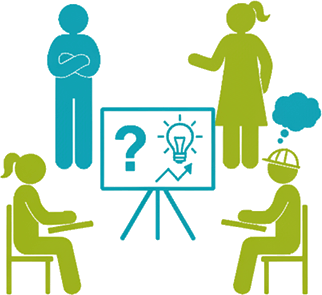Exploring Youth Pathways Across Europe
From preparation to fieldwork
After several months of conceptual development, practical design and methodological alignment, EDU-LAB is now entering a decisive phase: the start of empirical fieldwork. Over the coming 12 months, two central strands of research – qualitative Case Studies and the international Online Survey of Experts and Stakeholders (OSES-Delphi) will be carried out, providing the basis for future analyses and policy recommendations. Over the coming year, we will work directly with young people across Europe to better understand how they navigate education, training and employment pathways.
Case Studies

Being carried out in summer-autumn of 2025, the Case Studies follow a participatory research approach, in which young people will actively help shape the research process. Through focus groups, participatory workshops and structured diaries, participants share their experiences, decision-making processes and insights into how they navigate education, training and employment choices, pathways and transitions.
Where and Who
The fieldwork is being conducted in 12 locations across 7 European countries:
- Austria (Vienna and Graz regions);
- Finland (Helsinki and Tampere regions);
- Italy (Bologna region);
- Kosovo (Pristina region);
- Poland (Warsaw and Łódź regions);
- Portugal (Porto region and Santarém );
- United Kingdom (Birmingham and Worcestershire regions)

This selection ensures broad geographical, socio-economic and institutional diversity and covers a wide range of educational and labour market contexts. Between 600 and 960 young people (aged 15–30) will participate in the Case Studies, representing different levels of education (ISCED 3–8) and labour market experiences – including straightforward, interrupted and non-linear transitions, as well as NEETs and school dropouts. You can find more detailed info on the case studies here.
How We Work
Data collection is mostly qualitative and follows the highest ethical and data protection standards (including GDPR compliance). In addition to an initial short sociodemographic survey, three core methods are used:
- Focus Groups – exploring how young people experience and interpret their transitions and the barriers or enablers they face.
- Participatory Workshops – where youth collaborate with the support of the researchers to co-develop concrete solutions to the challenges they identify.
- Structured Diaries – providing longitudinal, personal insights into participants’ day-to-day reflections over time.
Next Steps
Recruitment has already started, and several teams are onboarding participants and beginning initial data collection. Fieldwork will be ongoing throughout autumn 2025, with researchers and youth participants collaborating closely to generate valuable insights for future analysis and policy recommendations.
Subscribe to our bi-annual newsletter and follow us on LinkedIn, Facebook, Instagram, and Bluesky to receive updates on our findings, events, and opportunities to engage with EDU-LAB.
